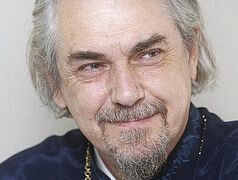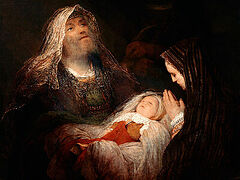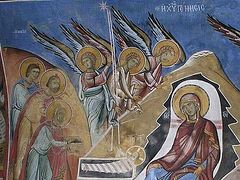 In the name of the Father, and of the Son, and of the Holy Spirit!
In the name of the Father, and of the Son, and of the Holy Spirit!
Today our Russian Orthodox Church prayerfully celebrates the Leavetaking of the Nativity of Christ. All the worship, chanting, reading, prayers, and rites breathe the ineffable joy of the celebration of the Nativity. The Leavetaking is the last grand chord to the departing feast.
After the bright days of Pascha, not a single Gospel event is celebrated by the Church with such spiritual joy as the Nativity of Christ. Nearly 2,000 years have passed since the day the great mystery of godliness (1 Tim. 3:16) was accomplished, but mankind, redeemed by Christ the Savior in the Church He founded on earth, never ceases, in the person of its best representatives, to offer Him a sacrifice of praise and thanksgiving.
So what is the meaning, the enduring significance and real, undying power of the Nativity of Christ for us, the Christians of today? Why does the Evangelists’ story about the Babe, God born in the manger, so excite our souls and make our hearts beat faster? By falling away from God, man established a terrible abyss which he himself was unable to overcome. With every cry and longing of his fallen soul, he began to strive to return to his Father’s house. But he could only wait and believe that someday the time would come for reconciliation with God.
And so, when the fullness of time came, God sent His Only Begotten Son. The Lord inclined towards us in His Divine love, and the Word became flesh, God became Man, and the dawn broke on the dark horizon of human history. In one Person, Jesus Christ, Divine and human nature were invariably and immutably united forever.
With the birth of the Christ Child, the centuries-old Old Testament barrier collapsed. Original Sin fell away like a husk, dissolved like mist. Man received the long-awaited opportunity to reunite with God. Feeble human nature, from the state into which it fell as a result of the fall, rose above the nine ranks of angels, reached the highest degree of the Divine nature with which it hypostatically united, and man was thus deified.
Therefore, the Nativity of Christ is a celebration of the new, second creation of life through the infusion of Divine light into it. “Think about all this, man, and rejoice in the spirit,” say the Holy Fathers. “You have been banished from Paradise, but now the doors of Paradise are opening for you. You have fallen from God, but now the Lord Jesus Himself comes down to you in the flesh to lead you into the primordial blessedness.”
But the Lord does not appear in glory, not in thunder and lightning, but in weakness, helpless and vulnerable, in the image of a newborn Child. In His Nativity, He gives Himself to our love, calling on us to respond to His defenseless with a protective love connecting us with Him. He, a little Child, capable of perishing with the slightest breeze, comes to us with the main question: Can I be born in you, in your soul, in your house, in your family, amongst your loved ones? Can I come to you? Will you let Me in? This is the mystery of the Nativity.
Then, 2,000 years ago, all the doors of the city of Bethlehem were closed to Him. No one agreed to give any shelter to the Holy Family. But there was no place either in the houses or the hearts of men. No one accepted His birth, and everyone will turn away from His death. Mankind sent Him on a long, endless path of suffering and deprivation, rejection and misunderstanding.
But was it like that only then, in the days of the Roman Emperor Augustus? Doesn’t this happen century after century? This Child is with us again today. And we often become like the people who lived in Bethlehem back then. How many souls fearfully close their doors when Christ knocks on them? Some are afraid to disturb their peace or confine themselves. Others are immersed in worries, while others have long since extinguished the spiritual thirst, the prayerful burning of the first Christians. And such people become ordinary, lukewarm commoners who speak about Christ in words while warming no one with their deeds.
There are also those who aren’t averse to giving God a certain place in their lives, but this place is usually somewhere on the margins of their being. And therefore, the thought of the Holy Fathers becomes clear—they said that Christ could have been born a thousand times in Bethlehem, but there’s no benefit to you if He isn’t born at least once in your own soul.
And today, Christ is looking for a new manger for His birth—the manger of human warmth, love, understanding. Only in a heart opened with repentance and tears can the light of the Nativity of Christ shine. We have to leave all the pride and arrogance of our mind, leave all the strife, enmity, disorder, avoiding all humiliation of others, slander, and condemnation, and hurry to the source of light, joy, mercy, and forgiveness.
And when love suddenly begins to warm up in our souls, it means Christ is being born in it. And then this love will move us to die for another. And we need not fear this love. We have to give ourselves to it completely. And then the incarnate Christ Child will become a reality not only of the bygone years of history, but also of our life today.
Amen.



